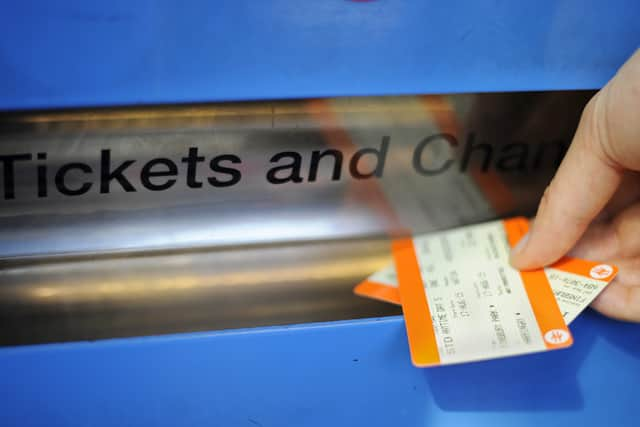Rail fare increase in England will be below inflation rate, Government says
and live on Freeview channel 276
Next year’s increase in rail fares in England will be below the current rate of inflation to help commuters cope with the cost of living crisis, the Government has announced.
Changes in regulated fares, such as season tickets, are traditionally implemented on the first working day of the year and are based on the previous July’s retail price index (RPI), which for 2022 will be announced on Wednesday (17 August).
Advertisement
Hide AdAdvertisement
Hide AdHowever, the Department for Transport (DfT) said next year’s rise in fares will be delayed until March and will be lower than the RPI figure for last month.


June’s RPI was 11.8% and an increase around that figure would add hundreds of pounds to the cost of many annual season tickets.
The news comes as rail industry bosses and the Aslef union are expected to hold formal talks in the coming days after a strike on Saturday (13 August) crippled large parts of the UK network.
What has the DfT said?
A DfT spokesperson said the increase, which usually comes into effect in January, will be delayed until March in a bid “to help struggling households”.
Advertisement
Hide AdAdvertisement
Hide AdThey said: “The Government is taking decisive action to reduce the impact inflation will have on rail fares during the cost of living crisis and will not be increasing fares as much as the July RPI figure.”
"We are also again delaying the increase to March 2023, temporarily freezing fares for passengers to travel at a lower price for the entirety of January and February as we continue to take steps to help struggling households."
It is not yet clear how much lower the rise will be compared to that RPI figure.
Meanwhile rail workers continue to strike over pay, with unions calling for pay increases to match the rising cost of living.
Advertisement
Hide AdAdvertisement
Hide AdOn Saturday around 6,500 train drivers who are members of the Aslef union walked out in a dispute over pay with nine rail companies, and more strikes are planned for the coming week.
Members of The National Union of Rail, Maritime and Transport Workers (RMT) and The Transport Salaried Staffs’ Association (TSSA) unions are set to walk out on 18 and 20 August.
Industrial action will also be taken on 19 August by London Underground and London bus drivers.
What have campaigners said?
Campaigners have been lobbying for the Government to do away with the RPI method of calculating the annual fare increase.
Advertisement
Hide AdAdvertisement
Hide AdPaul Tuohy, from the Campaign for Better Transport, told the Daily Mail even a small increase to fares could put large numbers of commuters off trains altogether, and called for an urgent freeze to fares for 2023.
Earlier this year the largest rise in rail fares in nearly a decade added more than £100 to the cost of many annual season tickets.
Commuters were hit hard by the price increase of up to 3.8% in England and Wales.
Wales usually makes similar fares changes to England while the Scottish Government has not announced in plan for 2023.
Fares in Northern Ireland are set by operator Translink, which does not use RPI.
Comment Guidelines
National World encourages reader discussion on our stories. User feedback, insights and back-and-forth exchanges add a rich layer of context to reporting. Please review our Community Guidelines before commenting.
